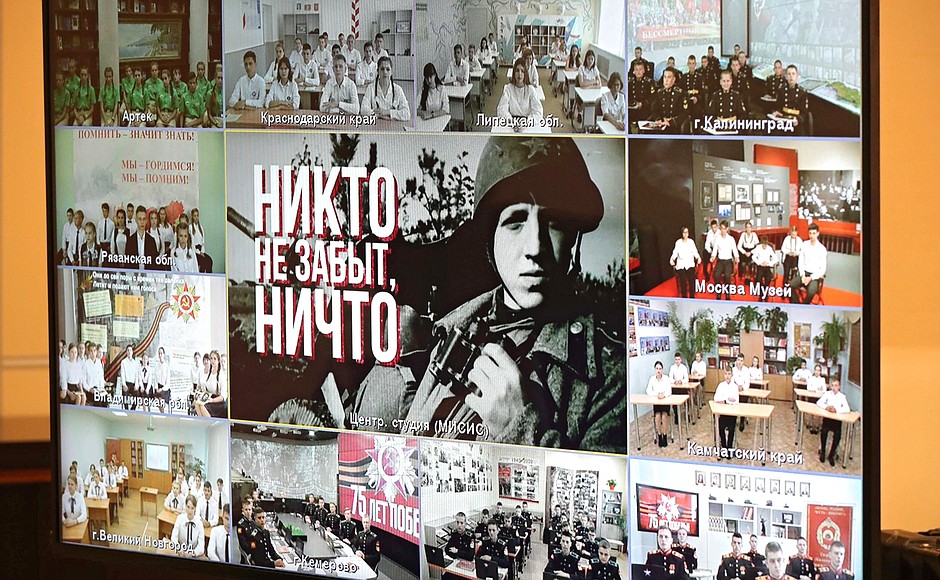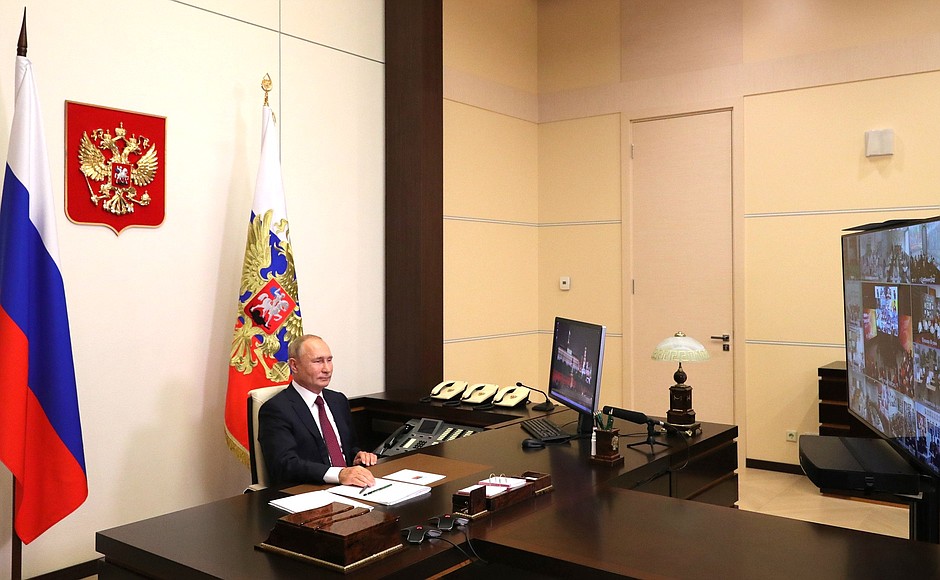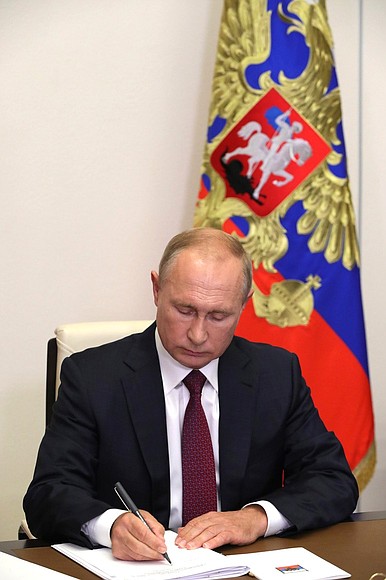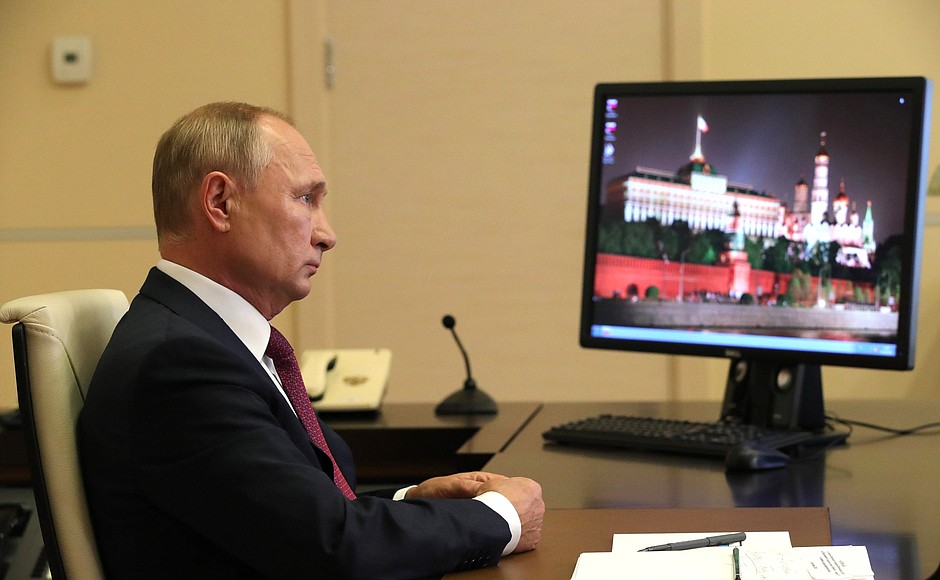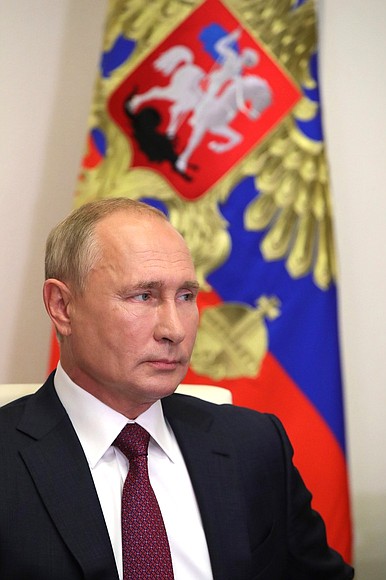The open online lesson is held for high school students and this year is dedicated to the 75th anniversary of Victory in the Great Patriotic War and the Year of Memory and Glory.
The President talked with students from Crimea, Karelia, Chuvashia, Krasnodar and Kamchatka territories, Novosibirsk, Kursk, Kaliningrad, Moscow, Novgorod, Lipetsk, Ryazan, Vladimir, Kirov and Kemerovo regions, as well as Moscow.
In addition to students, the lesson was attended by cadets at the pre-university academies of the Defence Ministry, including the Tver Suvorov Military Academy, Presidential cadet academies in Kemerovo and Petrozavodsk, and the Nakhimov Naval Academy in Kaliningrad.
The lesson was moderated by Viktoria Skripnikova, teacher of history and social sciences and winner of the Teacher of the Year 2019 nationwide contest, and Yana Churikova, TV host, journalist and Co-Chair of the Russian Movement of School Students.
* * *
Yana Churikova: Good afternoon, friends,
Let’s begin our nationwide open lesson. Today your teachers – well, not exactly teachers but a journalist and a teacher – will be me, Yana Churikova, and Viktoria Skripnikova. I would like to say a few words about her specially, because Viktoria won the Teacher of the Year 2019 contest. I am sure that the entire 9A class, all the pupils you teach history to are watching you from the faraway Kamchatka Territory, the village of Nikolayevka, and sending you their regards. It is an honour for me to hold this open lesson with you today.
Viktoria Skripnikova: Good afternoon, Yana. Thank you very much.
Today we have an excellent opportunity to talk to the entire country, share our impressions of the summer holidays and talk about the future.
Of course, we could not ignore a very important topic today. As you know, this year in Russia is the Year of Memory and Glory. We celebrate the 75th anniversary of the Great Victory. It is extremely important to preserve the historical memory, because remembering means knowing. This is the main theme of our online lesson today.
Yana Churikova: Remembering is Knowing is the theme of today’s online lesson.
I would like to note that it is great that on September 1, 2020, we have finally switched from online to offline, and today pupils, as usual, met at school, gave flowers to their teachers and finally sat down behind their desks. Congratulations. Hurray!
And now let’s return to the theme of our open lesson. Eyes on the screen.
(A video is shown.)
Viktoria Skripnikova: Right now we are at the central studio of the National University of Science and Technology MISiS. And today we will talk about a terrible topic, a terrible history of the 20th century: the Great Patriotic War. A war that affected not only adult Russians, but also children of the same age as you.
Yana Churikova: How can we prevent this history from becoming remote but keep it alive in our minds and, most importantly, in our hearts? Let’s test what we remember and know and find out what prevails in the minds of today’s pupils.
Viktoria Skripnikova: Twelve Russian regions have joined us today.
Yana Churikova: Welcome, everyone. We hope that the connection will be good today. And, friends, please welcome our special guest: President of Russia Vladimir Putin.
Good afternoon, Mr President. Welcome.
President of Russia Vladimir Putin: Good afternoon, Yana. Good afternoon, Viktoria.
Good afternoon to everybody who can see and hear us.
First of all, I would like to offer my heartfelt greetings to all the students and schoolchildren who are starting a new academic year and, of course, wish them good luck – especially first-grade pupils who are entering schools for the first time.
Certainly, I would like to offer my sincere greetings to your parents, mums and dads, as well as grandmothers and grandfathers and your entire families who are supporting you, caring for you and believing in you.
Knowledge Day is always a celebration touched by a special excitement as students are anticipating meeting their classmates and favourite teachers, with whom they will learn, debate and dream about the future together. These emotions are particularly strong this year.
They are particularly strong this year because during the spring months, you all, or the majority of you, I hope, realised how much you miss school and ordinary lessons in classrooms. Right now schools and the entire education system are returning to their normal activities, with school bells and breaks, and in-person communication between students and teachers. Of course, this return is a major event and a great joy for everybody.
It should be stressed that some restrictions will still be in place and I would like to specifically ask you to observe them. These restrictions are necessary to protect your health and the health of others around you – your grandparents, parents and everybody at school and at home.
Friends,
You are growing up and it is happening in a rapidly changing world with the swift development of technologies, influencing the most diverse areas of our lives, where scientific achievements make it possible for us to do today what seemed sheer fantasy only yesterday. And what is important is that the pace of these changes (and this is typical of the contemporary world) is huge and it will keep on increasing, and the world, which is complex enough even now, is becoming still more complex. Probably no one today can be 100 percent sure what subjects will be studied by today’s first year schoolchildren, whom we greeted at the beginning, what they will study in high school, which skills and professions will be most in demand in the 2030s.
You, just like the adults beside you, we all are following an unbeaten path. Well, it must have always been so, but I will say it again, the pace of these changes is increasing. However, no matter how fast the speed of change, there are things that will remain fundamental and unshakable. And I am sure they will be a firm ethical basis and a reliable reference point for you, which will always help you find the right path in life.
What do I mean? Above all, the history of our country and respect for it. Also, our culture that has given us and the entire world a constellation of brilliant personalities and an immense number of masterpieces. And finally, our traditions. And of course, our common memory, which ties us inseparably to our ancestors, to many generations of people, our relatives, who lived, studied, started families and dreamed as we are dreaming today, and created. And they also defended all this. And all this is our Fatherland.
This year we are celebrating the 75th anniversary of Victory in the Great Patriotic War, the Great Victory. You are still very young but I am sure that the Great Patriotic War and the victory in that war is not just a page in a textbook for you, but an important part of not only our common history, the country’s history, but also your family history.
I mean the stories told by you grandmothers and grandfathers about themselves and their relatives, their parents, grandmothers and grandfathers. Their carefully kept letters, photos and decorations are still preserved in many families.
Practically every family has its own war heroes, and nearly every Russian city, town and village has war memorials where people come to pay their respects to those who fought heroically for our Motherland.
An integral part of our national code and a synergic component of all people in our country are the poignant books and verses devoted to the war, many of which were written by those who fought on the frontline, the heart-breaking films about the Great Patriotic War, which strike a deep cord, and the songs that are the voice of our hearts. I believe you know them as well.
All of us honour the memory of our heroes; we admire them and their courage and staunchness, and the more we learn, the more we become convinced that no trial is more complicated or tragic than a war. Wars deprive people of a future, destroy dreams, ruin lives and have no mercy for anyone.
Very young people, agemates of today’s high school pupils, joined the army or partisans. Many of them claimed to be several years older to get a chance to fight the enemy. Teenagers and mere children worked at the factories and plants, which were moved away from the frontline, without any concessions to age, because they knew that nobody could do it other than them and their mothers. The teenagers who worked on the home front transferred part of their earnings to defence and the front. This is how entire tank columns, planes and complete air squadrons were built and named after them, like the Saratov Student, the Perm Pioneer or the Tatar Komsomolets. Just as those who fought on the frontline, people on the home front worked heroically, which is why we have introduced the honorary title of City of Labour Glory this year. It has already been awarded to 20 cities.
During the war, young people your age worked selflessly to help the country and fought on a par with adults in its defence. The entire nation rose against the horrible Nazi threat, both on the frontline and away from it. Our victory was a common achievement. And this sacred heroism of the entire nation must never be forgotten.
We must all realise and feel what is happening today. It may seem sometimes that it is no longer important because it happened so long ago, 75 years ago; that it has nothing to do with our life today and is not something interesting any more. I assure you that this is absolutely not true. Why? Because after World War II, the world order and the rules that we live by today were created. And there are some who believe that after the end of the Cold War (the heated World War II, a very violent war, was, unfortunately, followed by a cold war, a confrontation between different countries) they turned out to be winners; who believe that they are exceptional and the world order that was built after WWII needs to be changed. Creating conditions for such changes implies tweaking and rewriting actual historical events.
As we know (as a history teacher, Viktoria knows), people who cooperate with the enemy during a war are called and have always and everywhere been called collaborationists. Those who agree with the rewriters of history can easily be called the collaborationists of today. These people have always existed and will always exist, everywhere. They may have different motives which we are not going to discuss now. But it is important to understand that this matter is very topical these days.
We must know and remember the people who defended peace and freedom in our country, and remember those horrible years of war. It is our duty to those who fell, to our family history, the present and future generations. We must remember this, so that the horrors of Nazism and the tragedy of war will never happen again.
And do you know what the problem was? The problem was that the goal of the Nazis was not only clearing our country’s territory, subjugating the people of Russia and the Soviet Union, as they did in Europe, but also to eradicate the peoples of the Russian Federation and other Soviet republics.
What was their plan (that they fulfilled)? Some of our people were to be killed in concentration camps and gas chambers while some were to be used as slaves in forced labour. Those they did not find useful were supposed to be exiled to the east of the Urals, to East Siberia – basically, to die out. That was our enemies’ goal. It was a completely different story from what they were pursuing in Western Europe. If, like some people think today, we had surrendered our cities and towns without a fight, to spare our soldiers’ lives, we would have eventually lost that war, which would have resulted in the total extermination of almost all the peoples in the former Soviet Union and the present-day Russian Federation. This is the cost and value of the victory that our ancestors fought so hard to achieve.
I sincerely believe that you and your families will never have to face such ordeals. I regard this as a task for heads of state, responsible politicians, public activists and everyone who understand how fragile today’s world is.
Let me repeat: I believe that you will never have to live through such a thing. Back then, the fighting was terrible on both sides. I have already spoken about the Nazis’ plans and their real actions, but we saw some of that on the other side as well: for example, senseless destruction, to a certain degree, such as bombing of the German city of Dresden. The city was completely destroyed, for no military reason at all. The same is true about nuclear bombs dropped on the Japanese cities of Hiroshima and Nagasaki, where nuclear weapons were used against a non-nuclear country.
I am absolutely sure that young people today have the same selflessness, love to your home country and the honest ambition to be useful to Russia as those who won this victory for us, as well as the opportunities to show their best qualities today.
Young people who returned from the war fronts – almost the same age as you – practically devoured knowledge and studied hard to make up for the lost time as quickly as possible. They understood the value of knowledge. Among other things, this helped Russia restore its economy and clearly reach top global positions in various areas.
Many outstanding Russian scientists, such as Noble Prize winners Alexander Prokhorov and Nikolai Basov, for example, fought in the Great Patriotic War when they were in their early twenties. Very young scientists, including Igor Kurchatov and Anatoly Aleksandrov worked towards victory on the home front, solving essential front tasks and laying the foundations of the future Russian missile and nuclear shield to ensure its security for many years to come, until today. Today over 100 research institutes are names after brilliant scientists who made their contribution to victory both on the frontline and on the home front and continued their research after.
The value of knowledge is high as well today. Knowledge is becoming the main development resource in the sphere of global competition. The tighter the competition for knowledge and among people and states, the more difficult yet also more interesting will it be for you to acquire knowledge – I have no doubt about this – and, by the way, more will depend on you personally. You can choose any path and take advantage of all the available resources of modern education.
With the guiding hand of your teachers, I would like to wish all of you the possibility to achieve your goals, and I am quite sure that each of you has some specific talent. My wish is that you identify your strong sides and use them, use your hands and brains to become successful in life. We are trying to create all the necessary opportunities for this. However, as I mentioned, it depends on you alone, on your diligence and persistence to turn these opportunities into your future achievements in your profession, career, sports and science. As I have said more than once, your success ultimately translates into the success of the country as a whole.
I would like to wish you once again to remain inquisitive, seeking answers to thousands upon thousands of questions, and at the same time to remain kind-hearted and willing to extend a helping hand to those who may need it.
The active development of the volunteer movement has shown that this is very important and that the people need this. This has always been important, but it is now more important than ever before. No matter what problems we may encounter in life – both you and us – I am sure that you will find a solution thanks to your cleverness, diligence and persistence. Please, do not forget that by joining forces you will always achieve more, especially in the present-day world, as I have said more than once, because collective efforts – and it is very important to learn to work in a team – bring the best results, helping you to overcome any difficulties and find answers to the difficult challenges the world is facing now.
I hope that the new academic year will be full of new discoveries for you. I would like to wish you every success. All of us, that is, the adult part of the nation, all of us believe in you; we are sure that you will be successful, and we are counting on your success.
Thank you.
Let’s start the discussion now, the Q&A session, and let’s hear what information those who are attending this lesson have for us.
<…>
(School pupils told the President how they reinstate and preserve the memory of the participants of the Great Patriotic War, including family histories, their participation in patriotic events, their current life and studies as well as their interests and hobbies. Vladimir Putin replied to a host of questions concerning remote education, cybersports, the goals to pursue and books to read. He praised them for displaying interest in the history of the Great Patriotic War, for devoting time to it and sharing their knowledge of it with their agemates.)
Vladimir Putin: I would like to thank our moderators: Yana and Viktoria. I know that you are not just moderators but took part in the preparations for this major event.
I would also like to thank the participants in our current meeting in different regions of the Russian Federation, in all the schools that have taken part in today’s open lesson in one way or another.
And, of course, I would like to congratulate those that began their studies today, on September 1. I would like to wish all of you every success, both university students and school pupils. I am quite sure that you will succeed in everything you do.
I would like to recall a wonderful proverb we have: “A journey of a thousand miles begins with a single step.” I am absolutely sure that together with you we will resolve all the tasks facing the country. Why do I say “facing the country?” Because, strange as it may seem but even those who came to school for the first time, crossed over the school step and only started studying in the first class, are already tackling a very important national task by receiving the required knowledge and creating the conditions for the country’s forward movement. If each of us moves forward, the entire country is bound to move forward too.
I wish you all every success. Happy Knowledge Day!
